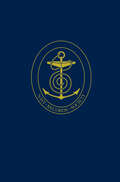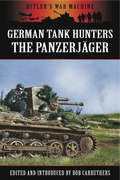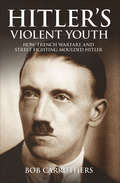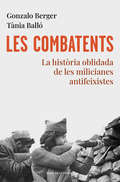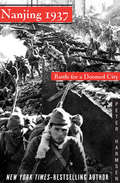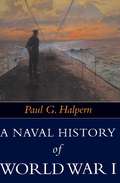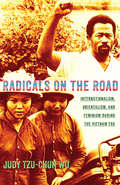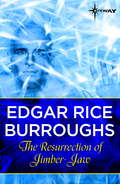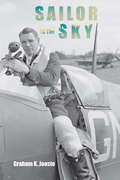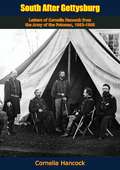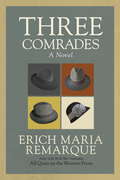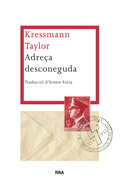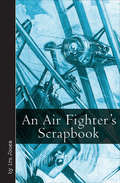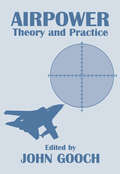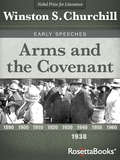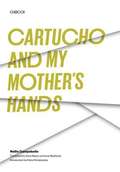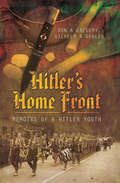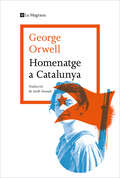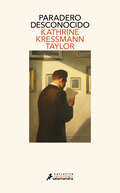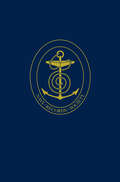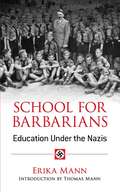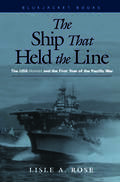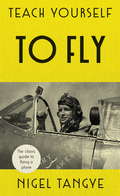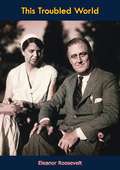- Table View
- List View
The Barrington Papers: Vol. I
by D. Bonner-SmithSamuel Barrington (1729-1800), a son of the first Viscount Barrington, entered the Royal Navy in 1740. He was posted in 1747 and eventually was promoted to Admiral in 1787.Papers in the possession of Barrington’s collateral descendants form these two volumes and cover his naval career. They comprise order books (1747-71), a private letter book (1770-99), his journal and three bound documents relating to the Leeward Islands command (1778-79), some loose correspondence, and printed matter: the general sailing and fighting Instructions, two signal books, and instructions. None of Barrington’s public letter books survives.This includes Barrington’s negotiations at Tetuan to release British subjects held by the Barbary corsairs, and his cruising off the coast of Guinea where some Royal Navy captains had been personally profiting from commercial dealings including the transportation of slaves.Commanding the 60-gun Achilles, he served from 1757-59 off the coast of France, in 1760 under Captain the Hon John Byron destroying the fortifications of Louisbourg in North America, and in 1761 under Commodore Augustus Keppel in the operations against Belle-Île. From 1762 until the 1763 Treaty of Paris, he commanded the 74-gun Hero. From 1768, when he again took to sea, until 1778 when he received his flag, he saw service in the dispute with Spain over the Falkland Islands (1771) and in the Channel.
German Tank Hunters: The Panzerjäger (Hitler's War Machine)
by Bob CarruthersThis unique collection of contemporary combat accounts provides a primary source insight into the reality of anti-tank warfare on the Eastern Front. Both armoured and infantry based operations are considered.This book is part of the 'Hitler's War Machine' series, a new military history range compiled and edited by Emmy Award winning author and historian Bob Carruthers. The series draws on primary sources and contemporary documents to provide a new insight into the true nature of Hitler's Wehrmacht.The series consultant is David Mcwhinnie creator of the award winning PBS series 'Battlefield'.
Hitler's Violent Youth: How Trench Warfare and Street Fighting Moulded Hitler
by Bob CarruthersAn Emmy Award–winning author and historian delves into the brutal early life of the man who would become Nazi Germany&’s maniacal dictator. Between 1889 and 1924, Adolph Hitler&’s political outlook was borne out of vicious incidents that heralded the formation of the Sturmabteilung—the notorious SA. Drawing extensively on Hitler&’s own biographical account in Mein Kampf, Bob Carruthers illustrates how these events influenced the future führer&’s worldview and led directly to the Beer Hall Putsch of 1923. Hitler&’s difficult relationship with his cruel father, his harsh experiences in Vienna, and his involvement in the Great War all conditioned him to celebrate violent acts. By Hitler&’s own account, his complete disregard for the consequences of his actions was vindicated by his victories in fierce encounters including beer hall brawls and street battles. Each successive triumph over adversity influenced his decision-making process, imbuing him with a love of violence and culminating in the ill-fated events of November 1924, which saw Hitler imprisoned for the second time. Carruthers also explores the parallel growth of the SA from a small group of fist fighters to a feared paramilitary force along with a comprehensive survey of the violent events between 1920 and 1924, which shaped this infamous political instrument of terror alongside the man who instigated World War II.
Les combatents: La història oblidada de les milicianes antifeixistes
by Gonzalo Berger Tània BallóTotes les protagonistes d'aquest relat són dones que van decidir afrontar l'embat dels sollevats mitjançant la lluita armada. La seva entrega i participació com a combatents en la lluita contra el feixisme va ser cabdal en l'estratègia bèl·lica per part del bàndol republicà. Però, a mesura que la guerra anava avançant, les seves organitzacions les van relegar a tasques a la rereguarda, fins i tot desprestigiant la seva condició com a milicianes. Finalment la història les va oblidar. Però qui van ser aquestes combatents? A quins fronts van lluitar? Com es va produir la retirada de les dones del front? Què van fer fins la derrota de l'any 39? Quin va ser el seu destí final? La recerca per tal de reconstruir les seves biografies i recuperar així el paper fonamental que van exercir en els fets històrics seran el fil conductor per explicar els fets des d'una perspectiva de gènere.
Nanjing 1937: Battle for a Doomed City
by Peter HarmsenThe infamous Rape of Nanjing looms like a dark shadow over the history of Asia in the twentieth century, and is among the most widely recognized chapters of World War II in China. By contrast, the story of the month-long campaign before this notorious massacre has never been told in its entirety. Nanjing 1937 by Peter Harmsen fills this gap. This is the follow-up to Harmsen's bestselling Shanghai 1937: Stalingrad on the Yangtze, and begins where that book left off. In stirring prose, it describes how the Japanese Army, having invaded the mainland and emerging victorious from the Battle of Shanghai, pushed on toward the capital, Nanjing, in a crushing advance that confirmed its reputation for bravery and savagery in equal measure. While much of the struggle over Shanghai had carried echoes of the grueling war in the trenches two decades earlier, the Nanjing campaign was a fast-paced mobile operation in which armor and air power played mayor roles. It was blitzkrieg two years before Hitler's invasion of Poland. Facing the full might of modern, mechanized warfare, China's resistance was heroic, but ultimately futile. As in Shanghai, the battle for Nanjing was more than a clash between Chinese and Japanese. Soldiers and citizens of a variety of nations witnessed or took part in the hostilities. German advisors, American journalists, and British diplomats all played important parts in this vast drama. And a new power appeared on the scene: Soviet pilots dispatched by Stalin to challenge Japan's control of the skies. This epic tale is told with verve and attention to detail by Harmsen, a veteran East Asia correspondent who consolidates his status as the foremost chronicler of World War II in China with this path-breaking work of narrative history.
A Naval History of World War I
by Paul G. HalpernThere have been a number of studies published on the activities of British and German navies during World War I, but little on naval action in other arenas. This book offers for the first time a balanced history of the naval war as a whole, viewed from the perspective of all participants in all major theaters. The author's earlier examination The Naval War in the Mediterranean, 1914-1918, centered on submarine activities and allied efforts to counteract this new menace. With this welcome sequel he again takes the reader beyond those World War I operations staged on the North Sea. Halpern's clear and authoritative voice lends a cohesiveness to this encompassing view of the Italians and Austrians in the Adriatic; the Russians, Germans, and Turks in the Baltic and Black Seas; and French and British in the Mediterranean.Important riverine engagements--notably on the Danube--also are included, along with major colonial campaigns such as Mesopotamia and the Dardanelles. The role of neutral sea powers, such as the Swedes in the Baltic and the Dutch in the East Indies, is examined from the perspective of how their neutrality affected naval activity. Also discussed is the part played by the U.S. Navy and the often overlooked, but far from negligible, role of the Japanese navy. The latter is viewed in the context of the opening months of the war and in the Mediterranean during the height of the submarine crisis of 1917
Radicals On The Road: Internationalism, Orientalism, and Feminism during the Vietnam Era (The United States in the World)
by Judy Tzu-Chun WuTraveling to Hanoi during the U. S. war in Vietnam was a long and dangerous undertaking. Even though a neutral commission operated the flights, the possibility of being shot down by bombers in the air and antiaircraft guns on the ground was very real. American travelers recalled landing in blackout conditions, without lights even for the runway, and upon their arrival seeking refuge immediately in bomb shelters. Despite these dangers, they felt compelled to journey to a land at war with their own country, believing that these efforts could change the political imaginaries of other members of the American citizenry and even alter U. S. policies in Southeast Asia. In Radicals on the Road, Judy Tzu-Chun Wu tells the story of international journeys made by significant yet underrecognized historical figures such as African American leaders Robert Browne, Eldridge Cleaver, and Elaine Brown; Asian American radicals Alex Hing and Pat Sumi; Chicana activist Betita Martinez; as well as women's peace and liberation advocates Cora Weiss and Charlotte Bunch. These men and women of varying ages, races, sexual identities, class backgrounds, and religious faiths held diverse political views. Nevertheless, they all believed that the U. S. war in Vietnam was immoral and unjustified. In times of military conflict, heightened nationalism is the norm. Powerful institutions, like the government and the media, work together to promote a culture of hyperpatriotism. Some Americans, though, questioned their expected obligations and instead imagined themselves as "internationalists," as members of communities that transcended national boundaries. Their Asian political collaborators, who included Buddhist monk Thich Nhat Hanh, Foreign Minister of the Provisional Revolutionary Government Nguyen Thi Binh and the Vietnam Women's Union, cultivated relationships with U. S. travelers. These partners from the East and the West worked together to foster what Wu describes as a politically radical orientalist sensibility. By focusing on the travels of individuals who saw themselves as part of an international community of antiwar activists, Wu analyzes how actual interactions among people from several nations inspired transnational identities and multiracial coalitions and challenged the political commitments and personal relationships of individual activists.
The Resurrection of Jimber-Jaw
by Edgar Rice BurroughsJimber-Jaw awakens to find his world has changed and it is now the twentieth century!
Sailor In The Sky
by Graham Jooste"He was the outstanding fighter pilot of the 1939-1945 war. His inspired leadership, added to his gunnery and implacable determination, made him second to none, a fact acknowledged by us all. Sailor was perhaps, a man more than any other, that could say in all truth: 'I Fear No Man'." Air Vice Marshall Johnnie Johnson, CBE DSO DFC, WW2 Fighter Ace Adolph Gysbert Malan, universally known as "Sailor", is regarded as one of the very greatest fighter pilots of the Second World War. As Graham Jooste's detailed, compelling and timely biography reveals, Sailor began life on a South African farm before joining the merchant navy. Even before the war, he quickly distinguished himself as a pilot. He would go on to play a vital part as one of the "Few" during the Battle of Britain in the summer of 1940, when the outcome of the whole war hung in the balance. While the bulk of the book rightly concentrates on Sailor's wartime experiences, Graham Jooste also details his political involvement in post-war South Africa, at a time when, to his horror, the ruling National Party had embraced an openly racist ideology and began to implement the country's notorious Apartheid system.
South After Gettysburg: Letters of Cornelia Hancock from the Army of the Potomac, 1863-1865 (American Biography Ser.)
by Cornelia Hancock Henrietta Stratton JaquetteShe was called “The Florence Nightingale of America.” From the fighting at Gettysburg to the capture of Richmond, this young Quaker nurse worked tirelessly to relieve the suffering of soldiers. She was one of the great heroines of the Union.Cornelia Hancock served in field and evacuating hospitals, in a contraband camp, and (defying authority) on the battlefield. Her letters to family members are witty, unsentimental, and full of indignation about the neglect of wounded soldiers and black refugees. Hancock was fiercely devoted to the welfare of the privates who had “nothing before them but hard marching, poor fare, and terrible fighting.”
Three Comrades: A Novel
by Erich Maria Remarque Arthur Wesley WheenFrom the acclaimed author of All Quiet on the Western Front comes Three Comrades, a harrowing novel that follows a group of friends as they cope with upheaval in Germany between World Wars I and II. The year is 1928. On the outskirts of a large German city, three young men are earning a thin and precarious living. Fully armed young storm troopers swagger in the streets. Restlessness, poverty, and violence are everywhere. For these three, friendship is the only refuge from the chaos around them. Then the youngest of them falls in love, and brings into the group a young woman who will become a comrade as well, as they are all tested in ways they can have never imagined. Written with the same overwhelming simplicity and directness that made All Quiet on the Western Front a classic, Three Comrades portrays the greatness of the human spirit, manifested through characters who must find the inner resources to live in a world they did not make, but must endure. "The world has a great writer in Erich Maria Remarque. He is a craftsman of unquestionably first rank, a man who can bend language to his will. Whether he writes of men or of inanimate nature, his touch is sensitive, firm, and sure."--The New York Times Book ReviewFrom the Trade Paperback edition.
Adreça desconeguda
by Kressmann TaylorUna història escrita sense complaença ni demagògia que descriu la tragèdia íntima i col·lectiva de l’Alemanya nazi. 1932 L’alemany Martin Schulse i el jueu nord-americà Max Eisnestein s’estimen com a germans i han obert plegats una galeria d’art a Califòrnia. Però Martin decideix tornar a casa, de manera que Max es queda sol per ocupar-se del negoci. Es cartegen amb freqüència des del primer dia, però quan Hitler accedeix al poder el 1933 la complicitat de la primera correspondència va derivant cap a l’horror. Adreça desconeguda va publicar-se per primera vegada el 1938, i en poc temps va ser considerada una obra mestra. Visionària, incisiva, i de desenllaç imprevisible, aquest llibre va ser tot un esdeveniment literari, el senyal d’alarma més estremidor contra el nazisme. Ressenyes:«Una història absolutament perfecta.»The New York Times «Una lliçó de literatura.»El País
An Air Fighter's Scrapbook (Vintage Aviation Library)
by Ira JonesA classic memoir of the early days of aviation by a longtime Royal Air Force pilot, including his harrowing, exhilarating adventures in the Great War. Ira &“Taffy&” Jones was a well-known air fighter during the First World War, having scored about forty victories flying SE5 scouts in France with 74 Squadron. Familiar in flying circles, Jones recorded stories drawn from his own experiences during the war and wrote of the many personalities he had met or known by association, both during the war and in the postwar flying years. An Air Fighter&’s Scrapbook recreates the atmosphere of the days of the biplane, of wartime flying, of early peacetime adventures in the air, the development of civil aviation, and breathtaking record-beating flights—all evoking the sheer delight in flying that characterized those early years.
Airpower: Theory and Practice
by John GoochThe nine contributors to this volume study the rapid development of airpower during the twentieth century as well as the methodological problems involved in assessing such change.
Arms and the Covenant (Winston S. Churchill Early Speeches)
by Winston S. ChurchillThis inspiring collection of campaign speeches from the British prime minister bring his oratory brilliance and powers of persuasion to life. Legendary politician and military strategist Sir Winston Churchill was a master not only of the battlefield, but of the page and the podium. Over the course of forty books and countless speeches, broadcasts, news items and more, he addressed a country at war and at peace, thrilling with victory but uneasy with its shifting role on the global stage. In 1953, he was awarded the Nobel Prize for Literature for &“his mastery of historical and biographical description as well as for brilliant oratory in defending exalted human values.&” During his lifetime, he enthralled readers and brought crowds roaring to their feet; in the years since his death, his masterful writing has inspired generations of eager history buffs. Well before Britain entered World War II, Winston Churchill warned his government about the growing Nazi threat, even as many European leaders were still urging caution and diplomacy. In this collection of forty-one speeches from 1928 to 1938, the great politician&’s prescience and political skill—vital to Britain&’s role as the first country to stand against Hitler—are clearly on display. This collection, which includes the famous &“Disarmament Fable&” speech, presents a fascinating look at Churchill&’s campaign to mobilize Britian against the rising Nazi threat, and showcases his versatility and genius as one of the best orators of the twentieth century.
Beat to Quarters (The Hornblower Saga, Book #1)
by C. S. ForesterCaptain Hornblower and the 36 gun frigate HMS Lydia are off the coast of Nicaragua searching for a route across Central America.
Cartucho and My Mother's Hands
by Nellie CampobelloCartucho and My Mother's Hands are autobiographical evocations of a childhood spent amidst the violence and turmoil of the Revolution in Mexico. They are noteworthy, too, as one of the few first-person accounts of the female experience in the early years of the Mexican Revolution and unique in their presentation of events from a child's perspective.
Hitler's Home Front: Memoirs of a Hitler Youth
by Don A Gregory Wilhelm R GehlenA &“candid and revealing memoir shows a normal boy and a family at war and in its aftermath, determined to do what it took to survive . . . fascinating&” (The Great War). When Adolf Hitler and the Nazi Party came into power in 1933, he promised the downtrodden, demoralized, and economically broken people of Germany a new beginning and a strong future. Millions flocked to his message, including a corps of young people called the Hitlerjugend—the Hitler Youth. By 1942 Hitler had transformed Germany into a juggernaut of war that swept over Europe and threatened to conquer the world. It was in that year that a nine-year-old Wilhelm Reinhard Gehlen, took the &‘Jungvolk&’ oath, vowing to give his life for Hitler. This is the story of Wilhelm Gehlen&’s childhood in Nazi Germany during World War II and the awful circumstances which he and his friends and family had to endure during and following the war. Including a handful of recipes and descriptions of the strange and sometimes disgusting food that nevertheless kept people alive, this book sheds light on the truly awful conditions and the twisted, mistaken devotion held by members of the Hitler Youth—that it was their duty to do everything possible to save the Thousand Year Reich.
Homenatge a Catalunya
by George OrwellL'edició definitiva de l'assaig de George Orwell sobre la Guerra Civil Espanyola, prologat per Miquel Berga i amb una nova traducció a càrrec de Jordi Ainaud. Homenatge a Catalunya és una obra imprescindible per conèixer aspectes essencials de la Guerra Civil Espanyola. El relat d'Orwell ha esdevingut un testimoni únic que recull les seves experiències a Barcelona i al Front d'Aragó. L'autor britànic va arribar el desembre del 1936 a una Barcelona en plena efervescència revolucionària i es va allistar de seguida a les milícies del POUM. Va tornar del front perquè una bala franquista li travessà el coll. Paradoxalment, va haver de fugir de Barcelona perseguit per les mateixes forces estalinistes que havien liquidat el dirigent del POUM Andreu Nin, després dels Fets de Maig de 1937. Aquesta edició inclou la versió definitiva de l'obra, un pròleg del professor i escriptor Miquel Berga, que reconstrueix amb mestratge la història editorial del llibre, i l'assaig "La guerra d'Espanya en retrospectiva". Escrit per Orwell el 1942, quatre anys després de la publicació d'Homenatge a Catalunya, aquest assaig es llegeix ara com un text clau per entendre l'impacte que va suposar per a Orwell la vivència de la guerra.
Paradero desconocido
by Kressmann TaylorUna novela visionaria que, sin asomo de complacencia ni demagogia y un sorprendente final, expone la tragedia íntima y colectiva de la Alemania nazi. Concebida como un intercambio epistolar entre Max Eisenstein, un comerciante de arte judío residente en San Francisco, y su socio comercial, Martin Schulse, que había regresado a Alemania en 1932 y escribe a su socio desde allí, Paradero desconocido cuenta el trágico desarrollo de una amistad y la historia de una amarga venganza. Construida con un suspense insuperable, desconcertantemente breve, en el que no sobra ni falta una palabra, esta novela magistral describe vívidamente el veneno en descomposición del nacionalsocialismo. Un relato visionario que, sin asomo de complacencia ni demagogia y un final sorprendente, expone la tragedia íntima y colectiva de la Alemania nazi. La crítica ha dicho...«Un cuadro premonitorio de la Alemania de Hitler a través de un intercambio de cartas entre dos alemanes a ambos lados del Atlántico.»Le Parisien «El libro está inspirado en la transformación ideológica que sufrieron unos alemanes que regresaron a su país tras haber vivido en Estados Unidos. Eran cultos e inteligentes, pero no toleraban críticas a Hitler. En un viaje a California se negaron a saludar a un amigo judío con el que se cruzaron. "¿Qué los había llevado a ese grado de crueldad?", se preguntó al presenciar esta escena la autora, Kressmann Taylor. Y escribió Paradero desconocido.»ABC «Una perfecta novela corta escrita por su autora para concienciar a sus amigos alemanes atacados de antisemitismo y en ella se narra un episodio de la persecución alemana a los judíos que impacta doblemente al lector: por su dramatismo y por su resolución literaria. Un libro único.»El País «En el terreno de la ficción, la estadounidense Kressmann Taylor publicó en 1938 (¡en 1938!) Paradero desconocido, una premonitoria advertencia contra la vesania nazi y el Holocausto, cuando sobre los campos de concentración solo había rumores y sospechas. Esta maravillosa y breve novela epistolar es a la literatura lo que es al cine El gran dictador.»La Vanguardia «La perfección misma. La denuncia más eficaz del nazismo hecha en un libro de ficción.»The New York Times Book Review
The Private Papers of John, Earl of Sandwich: 1771-1782, Vol. IV
by G.R. Barnes J.H. OwenThe Fourth Earl of Sandwich was First Lord of the Admiralty (for the third time in his long career) from 1771 to 1782. Blamed by the Whig opposition for many of the disasters of the American War, he was additionally loaded by 19th-century Whig historians with the false image of a corrupt libertine.It was the publication of these volumes of his correspondence and papers (then in the family home, now in the National Maritime Museum), covering the years 1771 to 1782, which restored his reputation as a conscientious and imaginative naval administrator and reformer, especially of the dockyards and of the timber question. Without entirely rescuing his status as a strategist, they showed very clearly the weaknesses at the heart of the North administration which damaged its handling of the war, and undermined Sandwich’s efforts.A fifth volume intended to cover his handling of naval patronage was overtaken by the war.This volume is from 1781 to 1782. The planned fifth volume was never completed.
School for Barbarians: Education Under the Nazis
by Erika Mann Thomas MannPublished in 1938, when Nazi power was approaching its zenith, this well-documented indictment reveals the systematic brainwashing of Germany's youth. The Nazi program prepared for its future with a fanatical focus on national preeminence and warlike readiness that dominated every department and phase of education. Methods included alienating children from their parents, promoting notions of racial superiority instead of science, and developing a cult of personality centered on Hitler. Erika Mann, a member of the World War II generation of German youth, observed firsthand the Third Reich's perversion of a once-proud school system and the systematic poisoning of family life. This edition of her historic exposé features an Introduction by her father, famed author and Nobel laureate Thomas Mann.
The Ship that Held the Line
by Lislie RoseThe American fleet aircraft carrier Hornet is widely acknowledged for the contributions she made to the war effort. The Doolittle Raid, launched from the Hornet's deck, inaugurated America's Pacific counteroffensive and transformed the aircraft carrier into one of the world's prime strategic weapon systems. She was one of three carriers to participate in the victory at Midway and the fighting around Guadalcanal. Through the experiences of this key warship and the eyes of her crew and the aviators who flew from her deck, Lisle Rose recreates the first desperate year of the war in the Pacific. He tells how the Hornet was molded into a deadly weapon of war, how the ship was fought and ultimately lost, and what it was like to live aboard her at a time when the fate of the United States depended on the Navy's tiny carrier fleet.In chronicling the carrier's operational history, the author contends that the fate of the Hornet's air group at Midway remains one of the great controversies in modern naval history and that the ship's importance in helping to keep the Japanese juggernaut at bay during the most critical period of the Pacific war is incontestable. His arguments ring true today as the controversy continues. Rose succeeds both in letting the reader see things the way the men of the Hornet did and in placing their experiences in a broad historical context.
Teach Yourself to Fly: The classic guide to flying a plane
by Nigel TangyeFirst published in 1938, Teach Yourself To Fly was not only one of the very first Teach Yourself books to be published but the first to actually change the world. It was used on the eve of the second world war to prepare pilot recruits and conscripts before they were called for service, and as such it was read religiously by thousands of young men, some as young as 17, and directly impacted on the British war effort.This beautiful new printing of the book captures all of the feelings of that extraordinary time - it's nostalgic, understated, inspiring and very British indeed, warning young pilots, amongst other things, not to feel 'too discouraged' in the event of a crash landing.Technology has changed hugely, but the principles of aviation as they were in the middle of the twentieth century are perfectly summarised in this lovely book. Get hold of the right vehicle, and it really can teach you to fly. What happens when you're up there, however, is your responsibility.Since 1938, millions of people have learned to do the things they love with Teach Yourself. Welcome to the how-to guides that changed the modern world.
This Troubled World
by Eleanor Roosevelt“We will have to want Peace, want it enough to pay for it, before it becomes and accepted rule.” With these words, Mrs. Roosevelt concludes her appeal for peace on earth, good will to men.During the past year, World Peace has seemed more difficult of achievement than ever before, despite the efforts of Leagues and Courts. This discouraging situation has inspired Mrs. Roosevelt, whose life is bound by special ties to the whole fabric of our country’s welfare, to express her own sincere beliefs on the subject. She has analysed many peace plans and, as a result of her studies, presents her own suggestions as to how permanent peace can be brought about.This is a thoughtful book, written by a woman who realises that it is easier to keep out of situations which lead to war than it is to bring about peace once war is going on. If we can dispassionately go over the difficulties which arise between conflicting interests within our own borders, we will be in a better position to understand and arbitrate the quarrels which lead to war among other nations.
